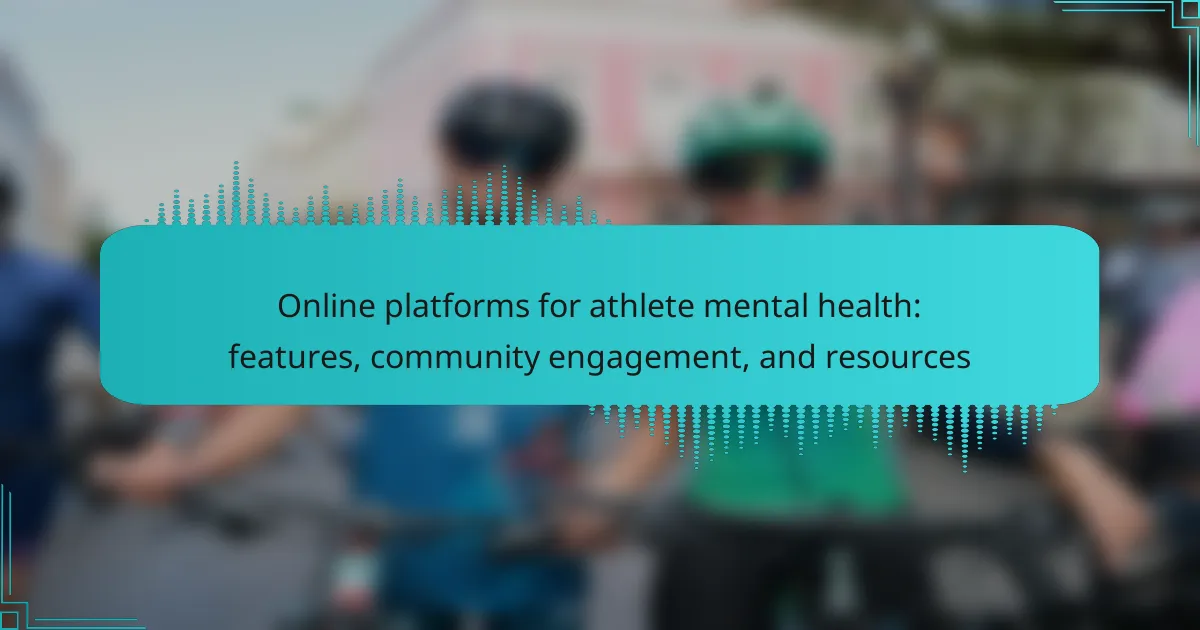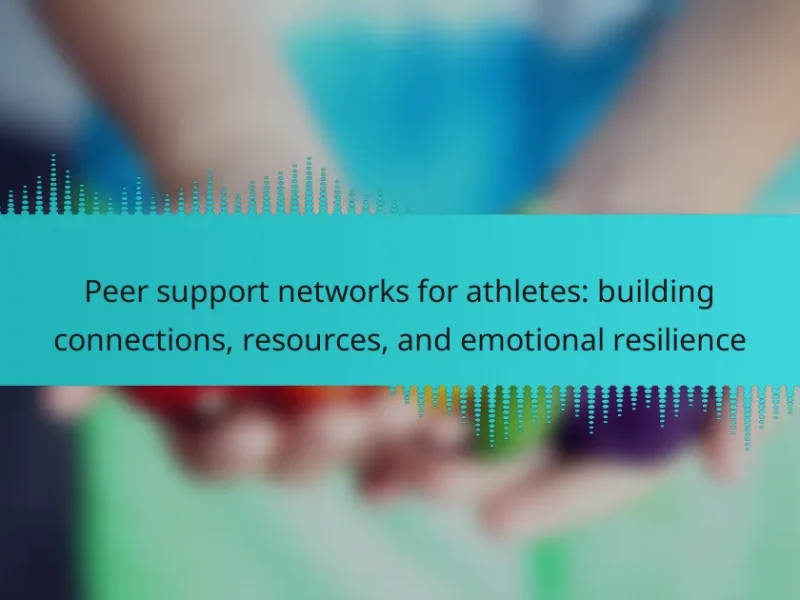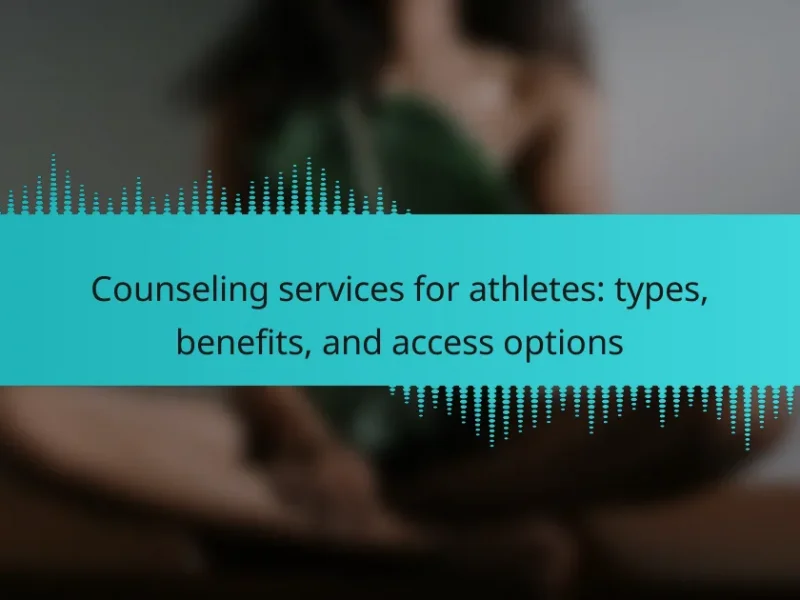Online platforms for athlete mental health provide essential tools for emotional support and community connection. They feature personalized assessments, virtual counselling, and peer support groups. These platforms enhance engagement through interactive features and exclusive events. Athletes can access vital resources, fostering resilience and a sense of belonging.
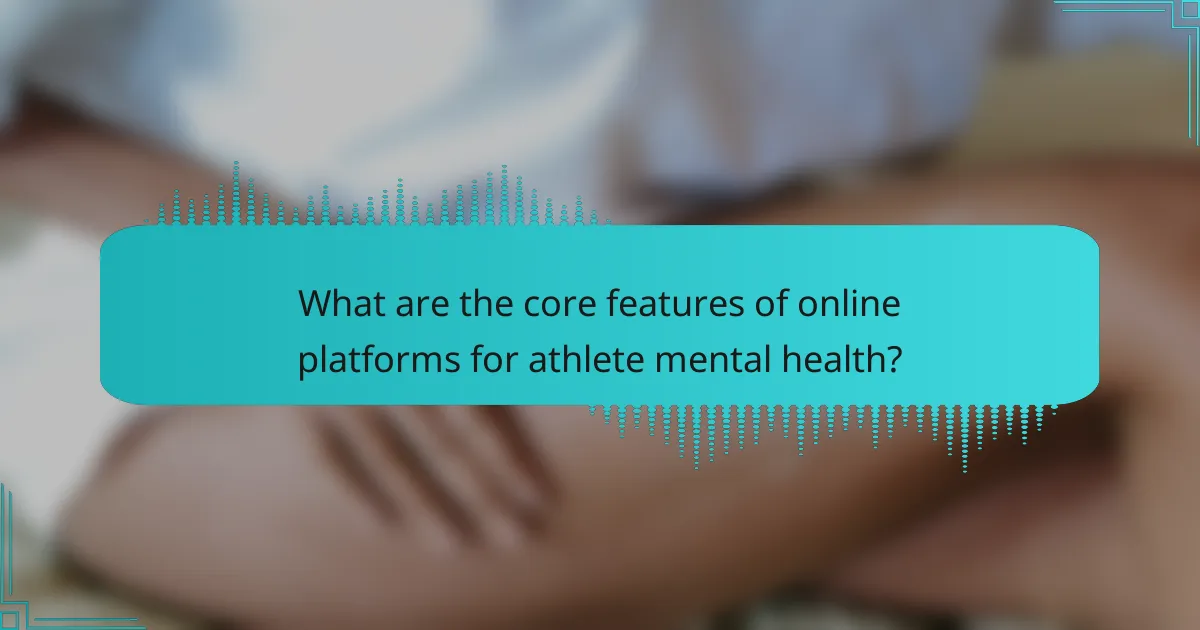
What are the core features of online platforms for athlete mental health?
Online platforms for athlete mental health feature tools for emotional support, community connection, and access to resources. Key features include personalized mental health assessments, virtual counselling sessions, peer support groups, and educational content on coping strategies. These platforms foster a supportive community by enabling athletes to share experiences and seek advice. They also provide resources like mindfulness exercises and stress management techniques, enhancing athletes’ mental resilience.
How do user interfaces enhance athlete engagement?
User interfaces significantly enhance athlete engagement by providing interactive features that foster community and support mental health. These platforms offer personalized resources, enabling athletes to track their mental wellness and connect with peers. Gamification elements, such as challenges and rewards, further motivate participation and retention. Additionally, user-friendly designs ensure accessibility, allowing athletes to easily navigate and utilise available tools.
What types of resources are commonly offered?
Online platforms for athlete mental health commonly offer resources such as access to mental health professionals, educational materials, community forums, and wellness tools. These resources support athletes in managing stress, anxiety, and performance pressure. Many platforms also provide unique features like personalized mental health assessments and peer support networks.
Which mental health tools are most effective?
Online platforms for athlete mental health are most effective when they offer comprehensive resources, foster community engagement, and include user-friendly features. Key platforms prioritise mental wellness through tailored content, peer support forums, and professional guidance. For example, features like mood tracking and mindfulness exercises enhance user experience. Community engagement is vital, as it creates a sense of belonging and support among athletes. Resources such as educational articles and access to mental health professionals further empower users to manage their mental health effectively.
What community features foster connections among athletes?
Online platforms for athlete mental health foster connections through features like forums, messaging, and shared resources. These elements create a supportive environment where athletes can engage, share experiences, and access mental health resources. Community-driven activities such as virtual events and peer support groups enhance interaction. Unique attributes like tailored content for specific sports or mental health challenges further strengthen these connections, making the platforms indispensable for athlete well-being.
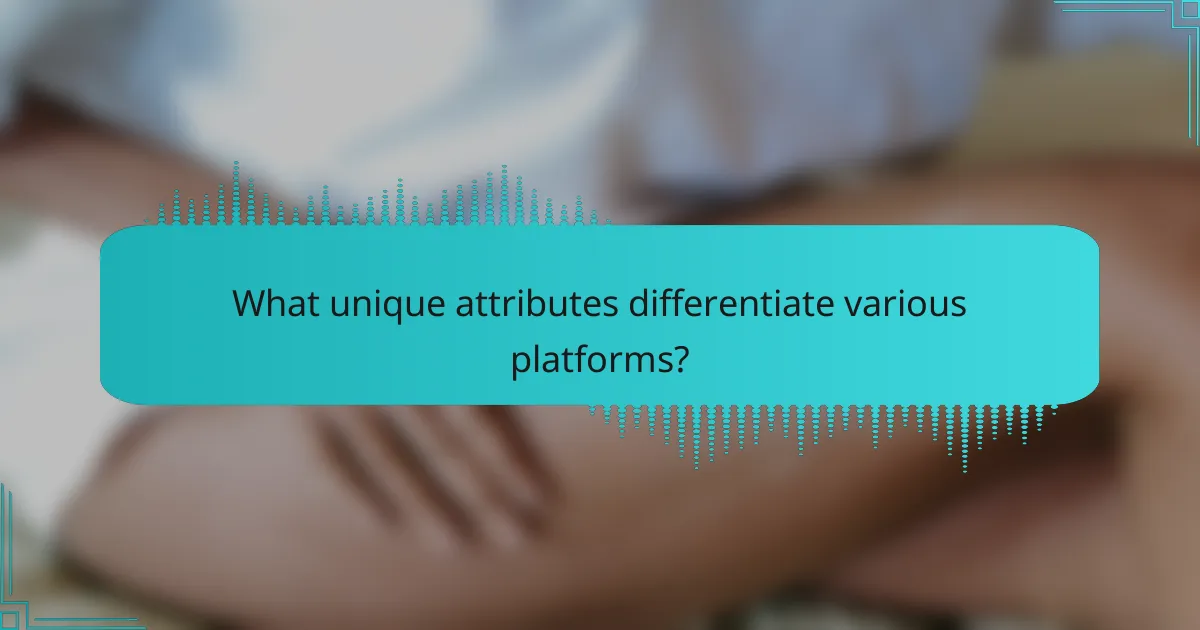
What unique attributes differentiate various platforms?
Various online platforms for athlete mental health differ in their community engagement, resource offerings, and unique features. For example, some platforms focus on personalized coaching, while others emphasise peer support networks. Unique attributes include specialised mental health assessments and interactive workshops. Additionally, platforms may offer rare features like real-time mood tracking or integration with fitness apps, enhancing user experience and engagement.
How do platforms tailor content for specific sports?
Online platforms tailor content for specific sports by analysing user preferences and engagement patterns. They utilise algorithms to deliver personalized resources, community interactions, and mental health support tailored to athletes’ needs.
Key features include sport-specific forums, expert articles, and mental health resources that resonate with athletes’ experiences. For example, platforms may offer psychological tips for overcoming performance anxiety in team sports or individual competitions.
Community engagement is enhanced through tailored events and webinars, fostering connections among athletes facing similar challenges. This unique approach builds a supportive environment that addresses the distinct mental health needs of various sports.
As a result, athletes find relevant content that not only promotes mental well-being but also encourages a sense of belonging within their sport-specific communities.
What innovative technologies are integrated into these platforms?
Online platforms for athlete mental health integrate innovative technologies such as AI-driven chatbots, teletherapy options, and data analytics. These tools enhance user engagement and provide personalized support. AI chatbots offer immediate responses, while teletherapy connects athletes with mental health professionals. Data analytics help track progress and identify trends in mental well-being.

What rare attributes can be found in select online platforms?
Online platforms for athlete mental health may feature rare attributes such as personalized mental health assessments and AI-driven support systems. These unique tools enhance user experience by tailoring resources to individual needs. Additionally, some platforms offer exclusive community engagement events, like live Q&A sessions with mental health professionals, fostering deeper connections among users. Another rare attribute includes gamified mental wellness tracking, which motivates users through interactive progress monitoring.
How do certain platforms address cultural sensitivities?
Certain online platforms for athlete mental health prioritise cultural sensitivities by incorporating diverse community input and localized resources. They often feature multilingual support, culturally relevant content, and partnerships with local organizations. These platforms engage users through forums and discussions tailored to different cultural backgrounds, ensuring inclusivity. Additionally, they provide training for moderators to handle sensitive topics respectfully, fostering a safe environment for all athletes.
What unique partnerships enhance platform offerings?
Unique partnerships enhance online platforms for athlete mental health by integrating specialised resources and expertise. Collaborations with mental health organizations provide access to professional guidance. Partnerships with sports teams foster community engagement, creating supportive environments. Collaborations with technology firms enhance platform features, offering innovative tools for mental wellness. These alliances ultimately improve user experience and resource availability.
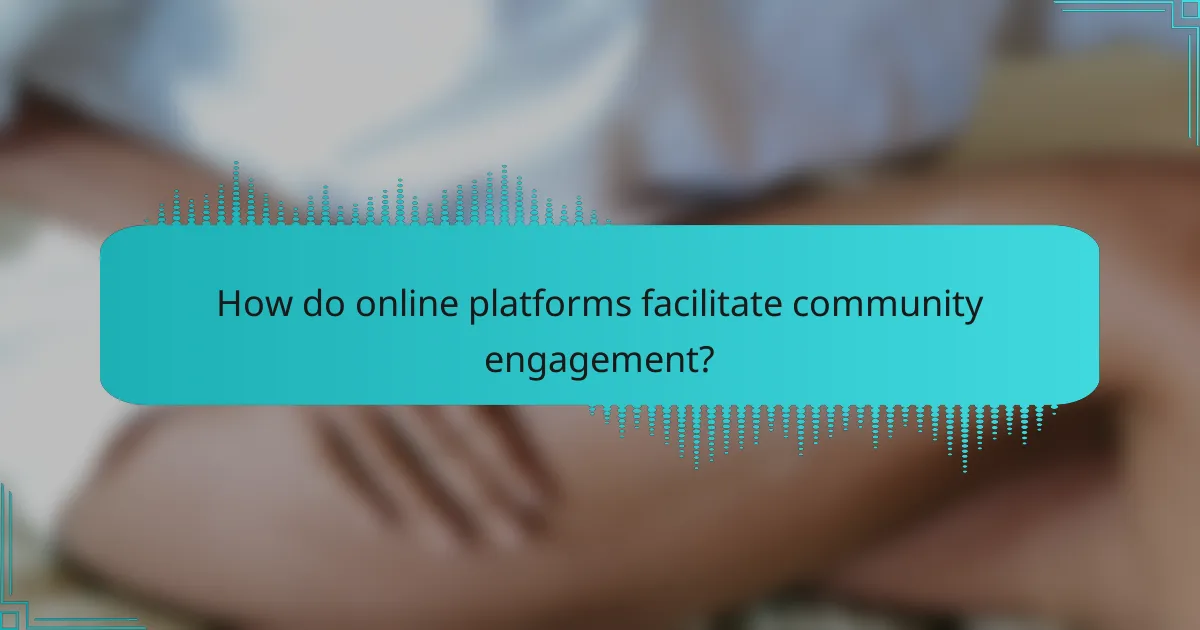
How do online platforms facilitate community engagement?
Online platforms enhance community engagement by providing interactive features that connect athletes with mental health resources. These platforms facilitate discussions, share experiences, and promote supportive networks. Features such as forums, live chats, and resource libraries encourage participation. As a result, athletes can access vital information and support, fostering a sense of belonging and collective resilience.
What strategies do platforms use to promote interaction?
Online platforms for athlete mental health promote interaction through community features, tailored resources, and engagement strategies. These platforms often utilise discussion forums, live chats, and webinars to foster connections among users. Gamification elements, such as challenges and rewards, encourage participation and enhance user experience. Regular updates and content sharing keep the community engaged, while personalized support options address individual needs. Additionally, partnerships with mental health professionals provide credible resources, reinforcing trust and interaction within the community.
How do social media integrations impact community building?
Social media integrations enhance community building by fostering connections among athletes and providing essential mental health resources. These platforms facilitate real-time communication, enabling users to share experiences and support one another. Features like group chats, forums, and live events encourage active participation, creating a sense of belonging. Integrations with mental health services offer immediate access to resources, reinforcing community trust and engagement. As a result, athletes feel empowered to discuss their mental health openly, promoting a culture of support and understanding.
What role do forums and discussion groups play?
Forums and discussion groups provide essential support for athlete mental health by fostering community engagement and sharing resources. These platforms allow athletes to connect, share experiences, and discuss mental health challenges. They create a sense of belonging, which is crucial for emotional well-being. Participants can access valuable information and coping strategies, enhancing their mental resilience. The unique aspect of these forums is their ability to facilitate peer support, which can be more relatable than professional advice. Additionally, they often feature expert-led discussions, further enriching the community’s understanding of mental health issues.
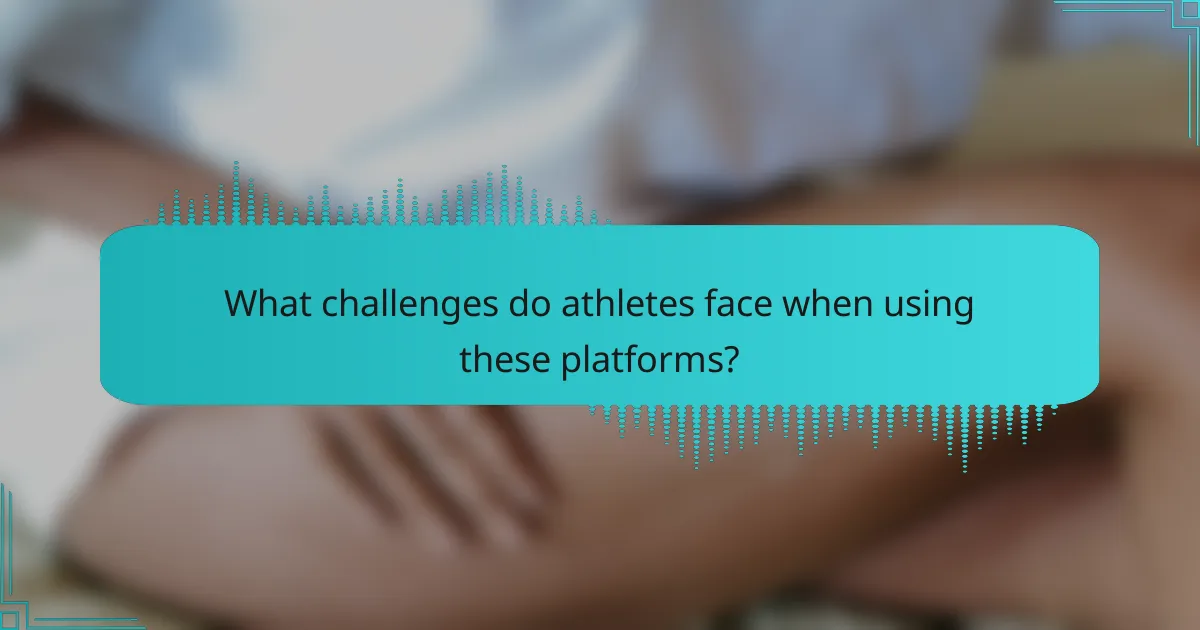
What challenges do athletes face when using these platforms?
Athletes face several challenges when using online platforms for mental health support. Privacy concerns can deter them from sharing personal experiences. Additionally, the lack of personalized engagement may lead to feelings of isolation. Some platforms may also offer limited resources, reducing their effectiveness. Lastly, navigating multiple platforms can be overwhelming, making it difficult for athletes to find the right support.
How can platforms improve user experience for athletes?
Online platforms can enhance user experience for athletes by integrating tailored mental health resources, fostering community engagement, and providing accessible support features. Personalized content, such as mental wellness articles and coping strategies, addresses athletes’ unique challenges. Community forums allow for peer support, creating a sense of belonging and shared experiences. Additionally, real-time access to mental health professionals through chat or video consultations can significantly improve athletes’ mental well-being.
What common misconceptions exist about online mental health resources?
Many misconceptions exist about online mental health resources for athletes. A primary misunderstanding is that these platforms lack personalization, while many offer tailored support based on individual needs. Another common belief is that online resources are less effective than in-person therapy; however, studies show comparable outcomes when engaging in virtual therapy. Additionally, some athletes think online platforms lack community engagement, but many foster active forums and peer support groups. Lastly, there’s a notion that these resources are only for severe mental health issues; in reality, they can benefit anyone seeking mental wellness, stress management, or performance enhancement.
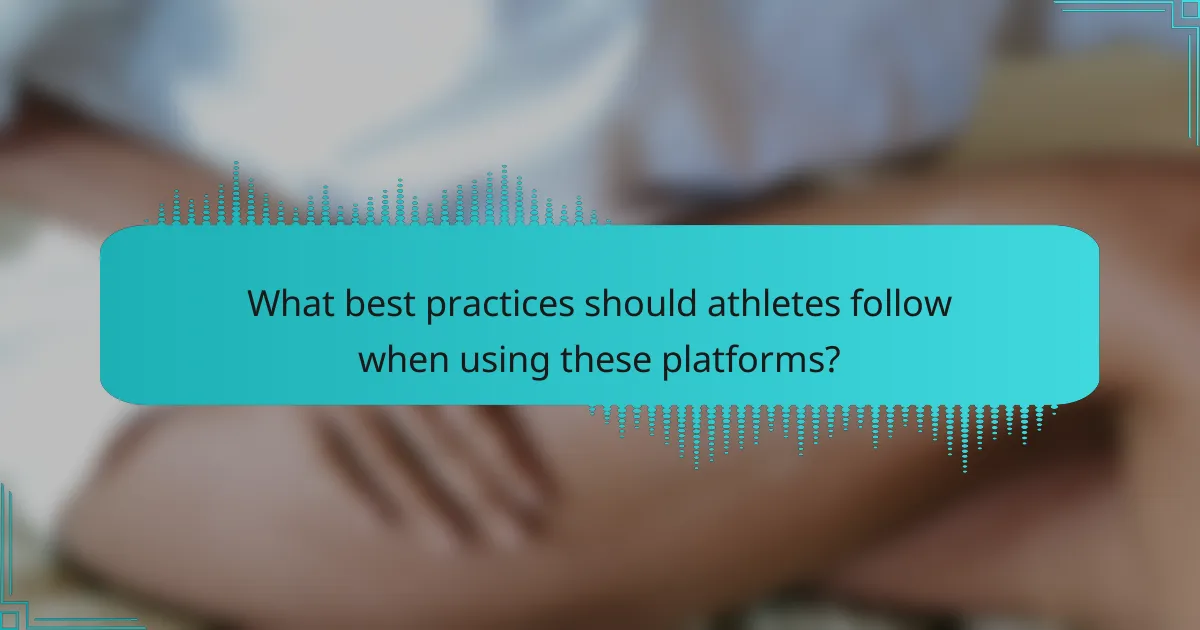
What best practices should athletes follow when using these platforms?
Athletes should prioritise authenticity, engage regularly, and utilise available resources effectively. Consistent participation fosters community connections, while sharing personal experiences enhances relatability. Setting boundaries around usage time can prevent burnout. Lastly, leveraging mental health resources offered on these platforms ensures comprehensive support.
How can athletes effectively utilize available resources?
Athletes can effectively utilize online platforms for mental health by engaging with community resources and accessing specialised features. These platforms typically offer forums for discussion, expert webinars, and mental health tools tailored for athletes. Community engagement fosters support networks, enhancing resilience and coping strategies. Resources such as articles, videos, and guided practices help athletes manage stress and improve overall well-being.
What mistakes should athletes avoid when engaging with online communities?
Athletes should avoid oversharing personal information, engaging in negative interactions, and relying solely on online advice. These mistakes can lead to privacy issues, mental stress, and misinformation. Instead, focus on constructive engagement and seek professional guidance when needed.
